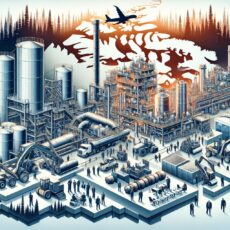The oil and gas industry in Canada is a fascinating and dynamic sector that plays a crucial role in the country’s economy. With its vast reserves and diverse landscapes, Canada is a leading global producer of oil and natural gas. In this blog post, we will explore the intricacies of Canada’s oil and gas industry, shedding light on its significance, challenges, and future prospects.
Rich Resources and Abundant Potential
Canada is home to abundant hydrocarbon reserves, making it one of the world’s largest producers and exporters of oil and gas. Its vast oil sands reserves in Alberta are estimated to hold more than 165 billion barrels of recoverable oil. Additionally, the country boasts significant conventional oil and gas reserves, with major production areas in Alberta, British Columbia, and Saskatchewan.
The extraction of oil and gas resources in Canada is heavily reliant on advanced technologies and techniques such as hydraulic fracturing (or fracking) for natural gas extraction. This method involves injecting a high-pressure fluid into shale formations, releasing trapped gas. The oil sands, on the other hand, require large-scale mining or in-situ extraction methods to extract the viscous bitumen.
Economic Impact and Employment Opportunities
The oil and gas industry in Canada is a major contributor to the national economy. It generates billions of dollars in revenue and provides significant employment opportunities. According to the Canadian Association of Petroleum Producers, the industry supports over 530,000 jobs across the country. These jobs range from engineers, geoscientists, and technicians, to skilled trade workers and administration staff.
Moreover, the industry’s economic impact extends beyond direct employment. It stimulates various sectors such as transportation, manufacturing, and construction, leading to a ripple effect that benefits numerous other industries. Furthermore, the royalties and taxes collected from oil and gas activities provide essential revenues for both federal and provincial governments, supporting public services and infrastructure development.
Environmental Challenges and Sustainability
However, like any industry, the oil and gas sector faces several challenges, particularly in terms of environmental sustainability. The extraction and production processes associated with oil and gas can have significant environmental impacts, including greenhouse gas emissions, land disturbance, and water consumption.
In recent years, a growing concern for the environment and the need to address climate change has prompted the industry’s stakeholders to adopt more sustainable practices. Efforts are underway to reduce carbon emissions through carbon capture and storage (CCS) technologies and the implementation of stricter environmental regulations. Additionally, companies are increasingly exploring cleaner energy alternatives and diversifying their portfolios to include renewable sources.
The Future of Canada’s Oil & Gas Industry
Looking ahead, the future of Canada’s oil and gas industry is likely to be influenced by various factors. Global demand for energy continues to rise, and fossil fuels are expected to remain significant contributors to the energy mix for the foreseeable future. This presents opportunities for Canada to play a crucial role as a reliable energy supplier to global markets, particularly in the context of the country’s abundant resources.
However, the industry is also navigating through a changing energy landscape. The transition towards cleaner energy sources and technologies, coupled with the increasing focus on climate change, may present challenges for the traditional oil and gas sector. As a result, the industry is evolving, embracing innovation, and exploring new avenues such as carbon-neutral oil production and renewable energy investments.
In conclusion, Canada’s oil and gas industry is a vibrant and transformative sector that fuels the nation’s economy while facing the challenges of energy transition and environmental sustainability. As the world continually evolves, the industry must adapt and embrace change, striving for a balance between economic growth, environmental responsibility, and the energy needs of the future. By nurturing innovation and exploring diverse solutions, Canada can position itself as a global leader in responsible oil and gas production, contributing to a more sustainable energy future.

